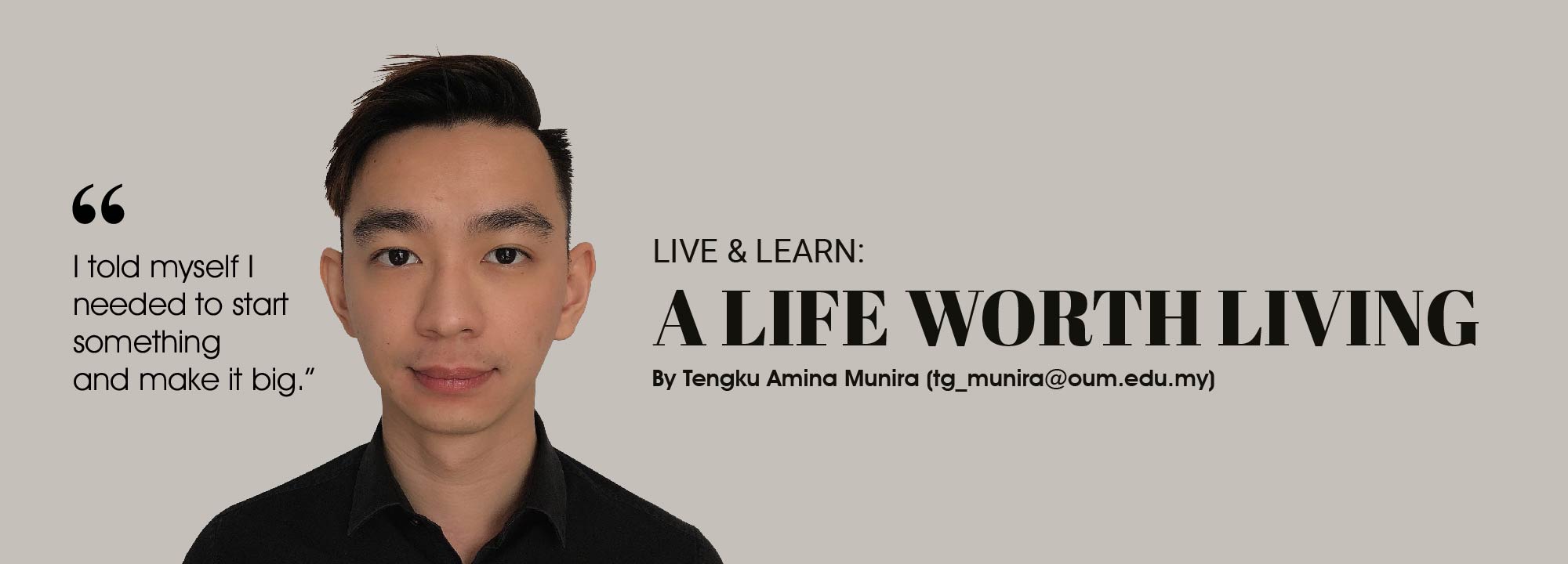
Reynolds Too has chalked up quite the life experience. In less than a decade, he has suffered an accident that forced him to undergo spinal surgery, endured joblessness, graduated with a Master of Counselling, and founded two companies.
His two-year unemployment stint left him depressed, and the menial position he landed later on gave him no satisfaction. It was only during his first semester at OUM that this behaviour therapist finally discovered his calling in life.
Too shares, “I was inspired by French philosopher Jean-Paul Sartre, who said, We are condemned to be free, and we have the freedom to choose our lives. This sparked something in me and snapped me out my depression. I told myself I needed to start something and make it big.
“With just RM70 in my wallet that day, I decided against buying dinner and went to Suruhanjaya Syarikat Malaysia to register my business instead. And that was how my first company was born.”
Drawing from his background as a psychology graduate and behaviour therapist, Too’s first company provides services to parents with autistic children. Four years on, this Subang Jaya native has decided to make yet another move.
“I just started Growth Special Needs Therapy, a company that offers home-to-home Applied Behaviour Analysis (ABA) therapy in the Klang Valley. ABA therapy is the only effective and scientifically proven therapy for autistic children. In Malaysia, it is expensive and can cost RM6,000 - RM10,000 a month,” he explains.
“We aim to provide budget-friendly ABA therapy, so my clients are diverse, from expatriates and the elite to those in the B40 bracket. We also conduct training for parents, as well as courses and talks for university students.”
Despite the ongoing pandemic, Too’s latest start-up is doing well, as the nature of its business is home visits. Ever the optimistic, he is looking forward to a bright future and believes technology will be essential: “Maybe we can start with online courses, instructional YouTube videos, or some kind of software. We hope to go international as well.”
Though just 30, he seems wise beyond his years and continues to dream of ways to make his life truly worthwhile: “Money isn’t everything. I want to create something that can help people, not burden them. I also believe we should create our own purpose. Humans are creatures of free will, so we should be free to choose who we want to be.
“In my mind, I’ve envisioned a future Reynolds Too: he is someone who can make a difference in the counselling/psychology industry and transform its outlook in Malaysia.”
He concludes, “My daily mantra is a quote by Friedrich Nietzsche: The individual has always had to struggle to keep from being overwhelmed by the tribe. If you try it, you will be lonely often, and sometimes frightened. But no price is too high to pay for the privilege of owning yourself. Ultimately, I want to be the best version of myself. I want to be someone people can depend on.”
Now with a career that gives him purpose, Too is certainly on his way.
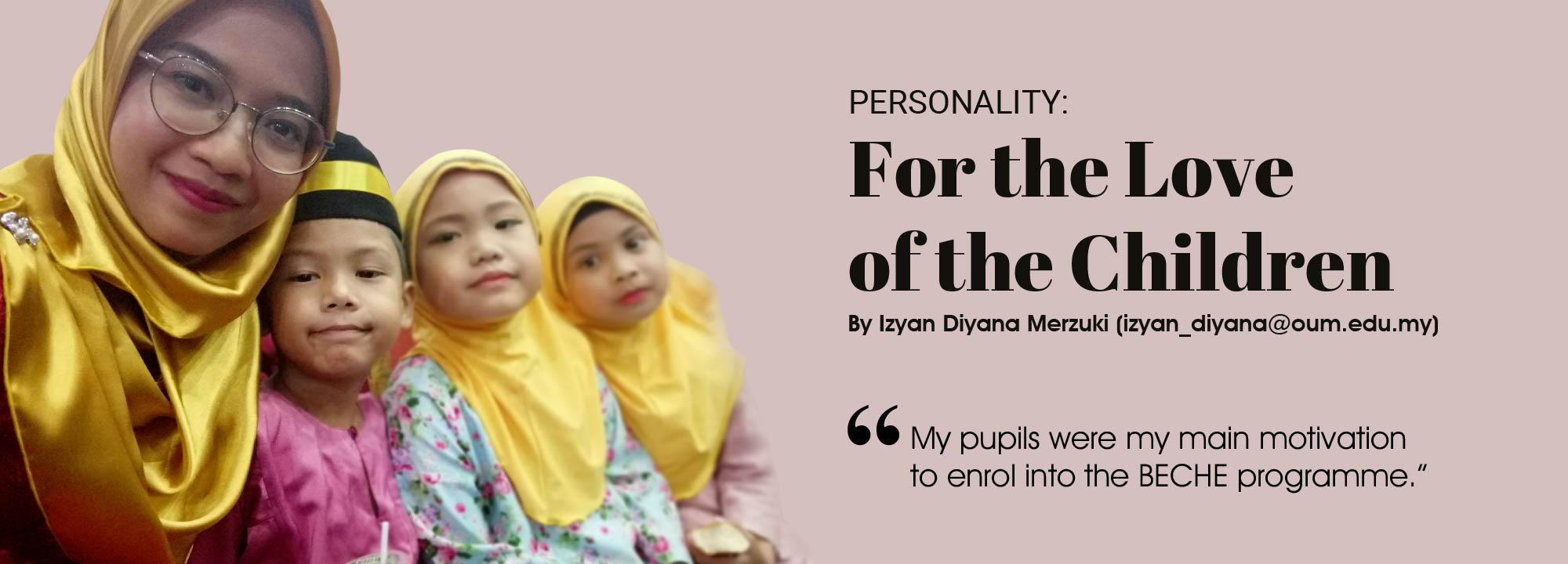
Nurul Filzah Ramli, 31, is living her dream of becoming a kindergarten teacher.
She has recently moved back to her hometown of Kangar, Perlis, to work at the local preschool, or Tabika KEMAS.
Graduating with the Bachelor of Early Childhood Education (BECHE) last year, Filzah believes the degree reaffirmed her love for the career and nurturing young minds.
“When I started working in the field in 2013, I struggled to understand and control children. That made me want to know more about children’s behaviour. My pupils were my main motivation to enrol into the BECHE programme,” shares Filzah, who is also a big fan of interior design that she practises by decorating the kindergarten where she works.
Recently married, this lovely lady had been a high-achieving student since her schooling days and continued her streak at OUM: she received the President’s Award at the 23rd Convocation for her outstanding academic performance.
“It was such a memorable experience. My parents’ happy faces overwhelmed me. Honestly speaking, graduating with the award never crossed my mind. It was something unexpected. Nevertheless, I was honoured and grateful to receive it,” Filzah says.
She adds, “I am thankful to my tutors for helping me with certain subjects. They were always available to explain and clarify things. I admired their expertise in the field.”
Despite juggling several commitments, her study was bearable due to the flexibility, particularly attending classes only on weekends. She also had the added advantage of applying her learning at work every day.
“There was nothing unusual about my study routine except I enjoyed the assignments. In fact, it was something I looked forward to every semester. Everything I learnt related to my pupils, so completing assignments helped me understand them even more.”
Years ago, a few people questioned her decision for choosing the field. “As I scored straight As in SPM, they thought I should choose a more professional path. But studying early childhood education and being a kindergarten teacher are nothing to be ashamed of. Their biased comments made me who I am today: proud and passionate about my career.”
Looking ahead, Filzah hopes to create a new curriculum based on Howard Garner’s theory of multiple intelligences. “I imagine myself creating a classroom atmosphere in which children can choose their own interests based on their own multiple intelligences. Maybe this can be the title for my master’s research. Who knows?”
This enthusiastic teacher wants only the best for her pre-schoolers: “I really hope I can be a good educator to them as they are now my main focus. I learn a lot from them and I’m hopeful about teaching them something valuable that they can remember for the rest of their lives.”
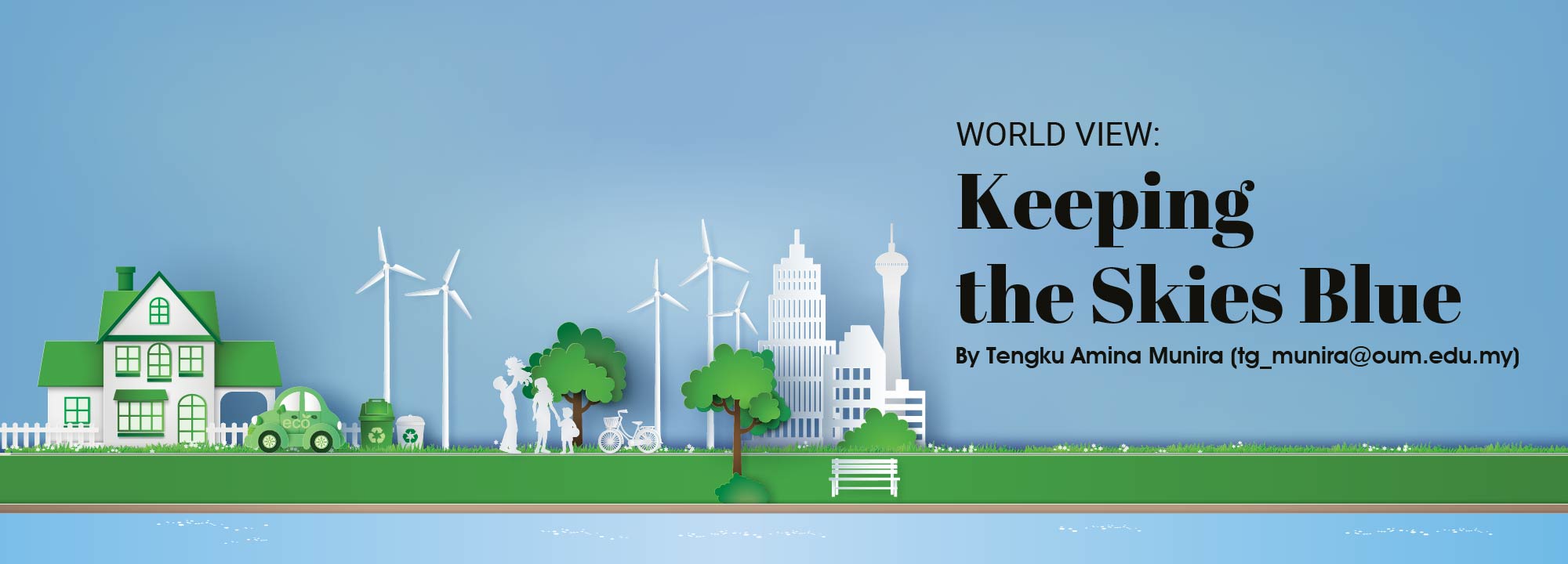
We’ve all heard the heart-warming story that dolphins returned to Venetian canals earlier this year thanks to fortuitous effects of the Covid-19 lockdown. Sadly, this isn’t true; it was just one of those social media hoaxes.
However, it is true that the pause in industrial activities have led to a dramatic plunge in pollution. According to NASA, levels of the toxic gas nitrogen dioxide across eastern and central China were 10-30% lower than normal when the region was placed under strict quarantine in January. Similar drops were reported elsewhere too, including Seoul, Manila, Bangkok, London, and also Kuala Lumpur.
This was a rare reprieve for the planet; some even called the situation “nature’s reset button”. Many rejoiced, though cynics realised it was rather ironic that we have become so used to polluted air that blue skies were a thing of marvel.
Months later, many industries have begun operating again. Full-scale development and all its polluting activities have returned to near-normal intensity. That reset function, it would seem, worked only for a short while.
Klang Valley folks know first-hand how true this is: in just two months, the illegal dumping of waste into local waterways has repeatedly left millions without clean water supply.
But let’s not just blame the big companies for this problem. With mindless use and disposal of plastics, senseless deforestation, rapid urbanisation and one of the highest percentages of car ownership in the world, all of us Malaysians need to admit some level of culpability in this matter. If pollution is left unchecked, the impact on our environment and health, not to mention contribution to climate change, is certainly something to be worried about.
As individuals, what can we do about this?
Start by saying no to plastics. Get used to bringing your own food containers, cutlery and shopping bags. Reject plastic straws or use biodegradable versions.
Carpool or use public transport, separate your garbage, use energy-saving devices, and learn to compost organic waste. Keep yourself safe from respiratory illnesses with washable facemasks instead of disposable ones.
At work, employees can recycle paper and reduce electrical and water consumption, while policymakers and government agencies need to find ways to encourage people to go green and punish errant companies that continue to flout environmental regulations. The Penang government has already taken its first step: to encourage use of recyclable bags, every plastic bag will cost RM1 come January 2021.
At OUM, you can learn more about the risks of pollution at organisational, national and global levels in the Bachelor of Occupational Safety and Health Management and Master of Occupational Safety and Health Risk Management programmes. Both are offered under the Cluster of Applied Sciences.
Let’s take this issue seriously. Let’s make blue skies, clear water and green lungs our reality, not just our dream.
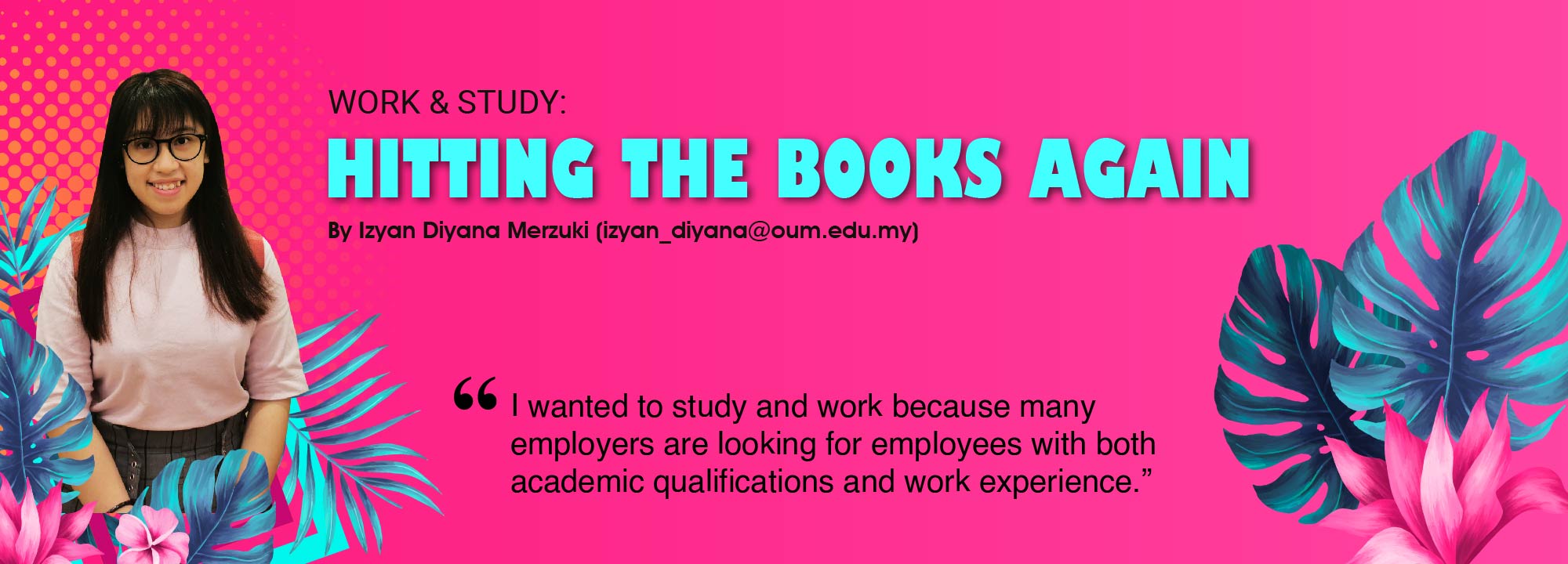
What is better than a bachelor’s degree? A master’s degree, obviously.
Emily Wong Oi Yan, a Bachelor of Occupational Safety and Health Management (BOSHM) graduate, is back at the University. This time, she’s taking up the Master of Business Administration (MBA) programme.
“Two years after graduating, I am coping well with my job as a sales executive in a packaging manufacturing company. Although my job scope is not related to my degree, I have joined the safety committee at the company, hence I am able to learn more about safety as well,” says Wong.
The 27-year-old is very skilled at juggling work and study simultaneously: she has proven this by bagging the President’s Award as the top graduate at the 22nd Convocation in 2018.
She explains, “While doing my degree, I took on a job as office administrator in an industrial trading company. I wanted to study and work because many employers are looking for employees with both academic qualifications and work experience.”
She adds, “My focus is now on the MBA. I want to enhance my knowledge in business and marketing as I realise I have very little knowledge about the field I am in. I hope the programme can help me prepare myself to take up more challenges in my workplace now.”
A tenacious lady, Wong takes every opportunity that comes her way as she believes in empowering herself to continue to be better in the future.
She says, “I’m still learning my way through my current industry and hoping to gain more experience and hands-on knowledge to build my confidence. I also believe that being firm with my decision while having a positive and clear direction will make it easy for me to achieve whatever goals that I have for my future.”
When asked if the current Conditional Movement Control Order (CMCO) in the Klang Valley affected her job, she shares, “I still go to work as usual. Since my workplace supplies essential goods to manufacturing corporations such as Nestlé and Mamee, we have approval from the Ministry of International Trade and Industry to continue running the production.”
Wong is serious and determined when it comes to work and study, but she still enjoys herself in the weekend or whenever she has free time by reading or hanging out with friends. “I do love reading romantic comedy novels, especially those by Sophie Kinsella and Cecilia Ahern.”
Despite her success, Wong remains humble: “I am just a normal girl, and I go through stress, ups and downs and mixed emotions at home, work, as well as in my friendships, just like anyone else.”
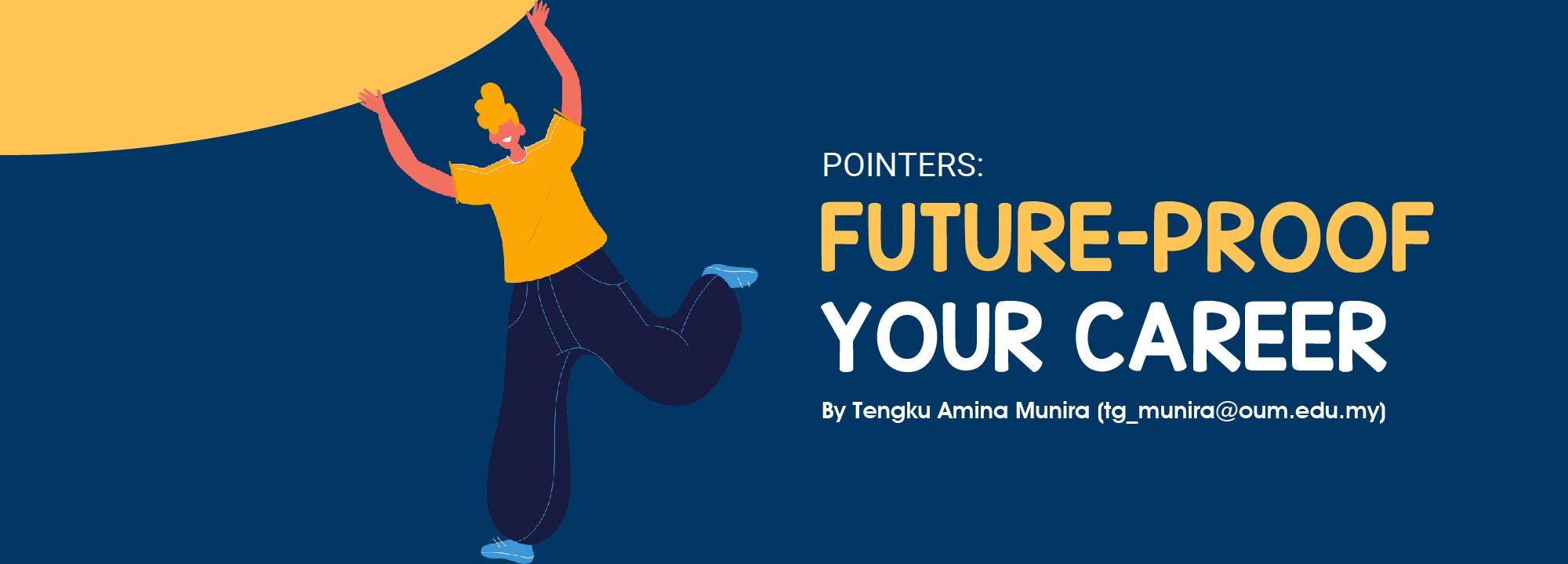
The world is in crisis. The pandemic is far from over, and many have had their wages cut or worse, lost their jobs. An economic recession may hit as early as 2021. Surviving this year is no guarantee you will survive the next, so if you want to continue thriving professionally, now is the time to prepare. Here are some ideas on what you can do to future-proof your careers.
Stretch your tech quotient.
Whether you take your business online or start using new apps at work, it’s important to improve your awareness of how things work in the digital world. Job-hunting may no longer happen face-to-face, so set up profiles on sites like LinkedIn to improve your visibility with potential employers. As online transactions will be the go-to option, you will also need to get comfortable with e-commerce and ‘fintech’.
Be mindful of your online footprint too: risqué photos, controversial posts or politically charged comments may not bode well for your future employment.
Make that jump.
Switching careers during a global crisis sounds crazy, right? Maybe, but the rewards can certainly be worth the risk.
The pandemic may have revealed the precariousness of your current position or inspired a new career path. Whatever the motivation, take the time to gauge the urgency of your job search. Determine a long-term goal, assess the longevity of your desired career, and accept that you may have to compensate with a lower salary or fewer benefits. Another point to consider is financial health: if this leap is indeed risky, you need to be financially ready for its potential repercussions.
Also, keep your options open. If you’re just starting a new business, you might need to fall back on a side job as a contract worker or freelancer if things go south.
Network, network, network.
Just like job-hunting, networking in this digital age can happen virtually, so find online opportunities to build connections with professionals and industry experts. Attend virtual networking events, sign up for webinars, and reconnect with old contacts for the latest on your industry or to get advice on a potential career change. Even if you aren’t looking for a new job right now, this is one way you can link current connections to future goals.
Learn.
This is a no-brainer. Even before the pandemic, picking up new knowledge has been touted as crucial for professional resilience. So take the time to list your qualifications, certifications, experiences and achievements. Identify the skills needed in your position or industry, or for your desired career. Then work out ways you can pick up those skills. There are plenty of online options, so there’s no excuse to be stagnant.
In closing…
The Mandarin word for crisis, “weiji”, is composed of two characters: one meaning danger, and the other opportunity. As scary as circumstances may seem, there is a chance for all of us to come out on the other side better, stronger and more competitive. The important thing is to start doing what we can to make that happen.